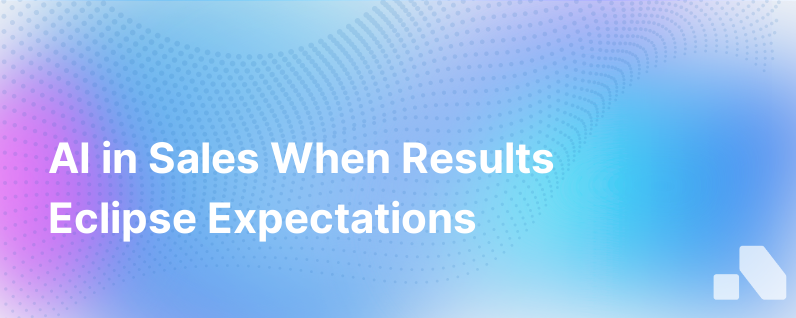Ai For Sales When Reality Beats Hype
Published on December 31, 2023 by David Zhang
In an era where artificial intelligence (AI) garners more buzz than perhaps any other technological advancement, it can be difficult to sift through the hyperbole to uncover its true potential—especially when it comes to sales. Yet, amidst the clamor, there is an undeniable reality: AI has successfully transcended the world of hypotheticals to deliver tangible benefits to sales teams and operations.
The turning point for many businesses comes when they move beyond treating AI as a novelty and start leveraging it as a foundational tool in their sales processes. This shift is most noticeable in organizations that have confidently aligned AI with their strategic goals, leading to outcomes that often exceed the initial hype.
In this article, we’ll explore AI's role in the sales sector, delineate the concrete advantages companies are reaping, and, importantly, guide you on how to practically integrate AI into your sales operations to beat the hype with genuine results.
AI's Promise in Sales
AI in sales often conjures images of robots aggressively dialing prospects or algorithms mysteriously boosting revenue. In practice, its role is much less dystopian and far more pragmatic. AI augments human abilities and automates routine tasks, freeing sales representatives to focus on what they do best—forge lasting relationships and close deals.
The proliferation of AI-powered Customer Relationship Management (CRM) systems, chatbots, predictive analytics, and bespoke AI tools like Aomni has led to a renaissance in how sales is conducted. These tools are transforming a multitude of sales functions, from lead generation and qualification to customer engagement and retention.
AI Breaks Free from Theoretical Constraints
Where AI in sales truly begins to shine is in its adaptation to real-world complexities. Sales is an inherently human and unpredictable domain, yet AI has proven adept at navigating these waters.
Here are the domains where AI has moved from conjecture to concrete impact:
Enhanced Lead Scoring and Prioritization
AI algorithms can assimilate vast amounts of data—from interaction histories to real-time behavioral analytics—to score leads more accurately than ever before. Reps can now prioritize their efforts based on which leads are truly ready to convert, ultimately driving more efficient and effective sales processes.
Dynamic Price Optimization
Companies are utilizing AI to dynamically adjust pricing based on market conditions, competitive analysis, and customer profiles, leading to optimized sales margins without compromising competitiveness.
Sales Forecasting Precision
Instead of relying solely on historical data, AI can predict future sales trends with a surprising level of accuracy. This predictive prowess allows organizations to strategize with confidence, allocate resources effectively, and manage inventories with unprecedented foresight.
Smart Personalization at Scale
Tailoring communication to individual clients is not new, but AI elevates it to a new level. By analyzing customer data points, AI helps salespeople craft highly personalized messages and offers, increasing relevance and impact.
Real-Time Assistance and Coaching
Using natural language processing and machine learning, AI can now provide real-time guidance to sales representatives during customer calls, suggesting responses, and collating information on the fly to support complex negotiations.
Automating Sales Administration
Freed from data entry, reporting, and other administrative tasks thanks to AI’s automation capabilities, sales teams can invest more time in relationship building and strategic planning.
Implementing AI Beyond the Hype
Now that we have established AI's concrete benefits in sales, how do businesses ensure they are harnessing its full potential while steering clear of empty hype? The answer lies in strategized implementation:
-
Start Small and Scale: Begin by implementing AI to tackle specific sales process challenges or inefficiencies. Measure performance improvement and scale with confidence.
-
Align with Business Goals: AI implementation should be closely tied to your strategic goals. Whether it's increasing lead conversion rates or reducing sales cycle times, AI initiatives must be focused on tangible objectives.
-
Integrate Human Insights: The best AI systems for sales are designed with significant input from end-users—the salespeople themselves. Their insights ensure that AI solutions address practical needs and enhance usability.
-
Continuous Training and Learning: Both AI systems and the employees using them require ongoing training. This ensures that algorithms remain accurate and that staff can leverage AI's capabilities fully.
-
Leverage Clean Data: AI's effectiveness is contingent upon the quality of data it's fed. Investing in proper data governance is not optional—it's a fundamental requirement for successful AI in sales.
-
Ensure Ethical Usage: AI in sales must be employed ethically, with due consideration to customer privacy and consent. Transparent handling of customer data is critical for maintaining trust and compliance.
In Conclusion
When AI for sales is approached methodically and integrated thoughtfully into the sales process, reality indeed beats hype. The evidence is in the improved efficiency, accuracy, and efficacy of sales operations.
Now is the time for businesses to look beyond the AI hype and understand how to implement it effectively. At the end of the day, the true measure of technology’s worth is found not in its theoretical potential but in the real value it brings to every client interaction and closed deal. Aomni is a prime example of an AI solution that, with zero effort required by you, offers real-time intelligence and personalized sales content—helping you to sell strategically and with impact.